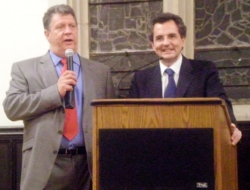Sant’Egidio president calls for friendship with the poor
CHESTNUT HILL -- Proverbs 21: 13 tells us that “He who shuts his ear to the cry of the poor will himself also call and not be heard.”
The Community of Sant’Egidio, a public lay association dedicated to evangelization and charity, takes this passage very seriously, according to the community’s president Marco Impagliazzo.
“The poor have become our fellow travelers, our friends,” he said at Boston College on Oct. 4, the feast day of St. Francis of Assisi. “They are the limbs of Christ in need of help.”
Impagliazzo traveled from the community’s headquarters in Rome to give the lecture entitled “A Church of All, especially a Church of the Poor.”
More than 200 students and professors, Sant’Egidio members and others gathered in Boston College’s Gasson Hall to hear Impagliazzo’s talk and Cardinal Seán P. O’Malley’s response. The event was sponsored by BC’s Institute on Religious Education and Pastoral Ministry as well as the Church in the 21st Century, a BC program focused on dialogue in the Church. The lecture was the first in the C21 series “Building Up the Body of Christ: What does it take to create a great Catholic community?”
The Community of Sant’Egidio began in Rome in 1968. There are currently more than 50,000 members in more than 70 countries. Their mission is prayer, communicating the Gospel, solidarity with the poor, ecumenism and dialogue to resolve conflicts.
The community began a presence in Boston at BC in 1998. The local community has since expanded to 60 members and now serves the elderly in three locations and helps inner-city children through an after-school program in Jamaica Plain. Members gather for prayer three times a week, reflections once a month and annual nationwide retreats.
Marco Impagliazzo, author and professor of modern history at the University of Perugia in central Italy, joined the Sant’Egidio community at 15 years old and became its third president four years ago.
In his talk, Impagliazzo stressed the importance of prayer and love for others.
“Love throws down the dividing wall that separates men from each other,” he said. “Our love for the poor is protected and nourished by prayer.”
Impagliazzo spoke about the role of the poor throughout Church history and their role in the 21st century Church. Because of globalization, people today see so much war and poverty, and it is human to feel hopelessness in the face of so much suffering, he said.
“Faith makes us not lose hope in things that are impossible,” he said. “Hopeless and desperate people end up living for themselves.”
Because of the suffering in the world, Christians cannot afford to live only for themselves. They must be the protectors of the unborn, elderly, disabled, foreigners and more than 1 billion people who live on less than $1 a day, he said.
“Concerning the hardness of heart of the culture that only the Gospel can break down, to evangelize is to save our world from being arrogant in its happiness,” he added.
Impagliazzo reminded those gathered that, “The poor are not only a stomach.” Their needs include friendship, and they should be treated like members of the family. The poor are part of the Church and part of its mystery, he said.
“The poor are still the heart of the Church -- today more than ever because more can be done and more can be seen,” he added.
In his response, Cardinal O’Malley spoke about St. Francis, a rich young man who took on poverty to respond to God’s call. The Church must respond to the poor like St. Francis, moving beyond philanthropy and programs to friendship and solidarity, he said.
In a society that is ever more individualistic, materialistic and addicted to entertainment, it is the responsibility of Christians to bring about a civilization of love. Our current culture reveres the rich and famous of Hollywood. In contrast, the poor are often very unglamorous, he said.
In Jesus’ parable of Lazarus and the rich man, the rich man -- condemned to hell for his lack of charity -- is the one who is anonymous, he added.
“The rich man is condemned not for murder, adultery or being part of the Enron scam. He is condemned because he was blind to the human suffering on his doorstep,” he said.
Kerri Marmol, a member of Sant’Egidio in Boston, said that the event was a “precious moment” in the life of the local community. Impagliazzo’s visit was like that of a visit from an older brother who brought the wisdom of the whole family with him. While in Boston, Impagliazzo also toured the city and visited the places where the local community serves, she said.
“This topic really is the core of what our community is about -- the poor and the friendship with the poor. That is a point we can gather around,” she said. “As a Christian and as a Catholic you are called to pray and to care for the poor in some way.”
Mallory Champa, a junior studying elementary education and theology at BC, said that she was struck by the quote from Proverbs. The verse speaks strongly to our responsibility as Christians, she said.
More than simply a responsibility, service to the poor and reaching out to others is a blessing -- a gift from God, she added.
Kathryn Getek, a member of Sant’Egidio studying for a doctorate in theology at BC, said that she enjoyed the fact that the event was both a lecture and a call to service.
“I was excited to have such an academic audience treated to a lecture that transcends academic discourse,” she said. “We were invited to a way of being.”
For more information on the local Sant’Egidio community, visit their Web site at http://www.santegidiousa.org/boston.



















